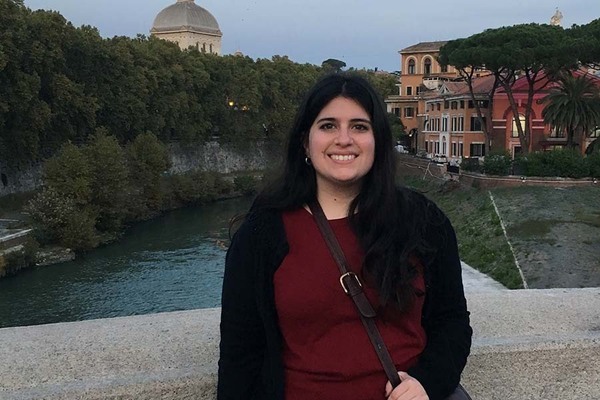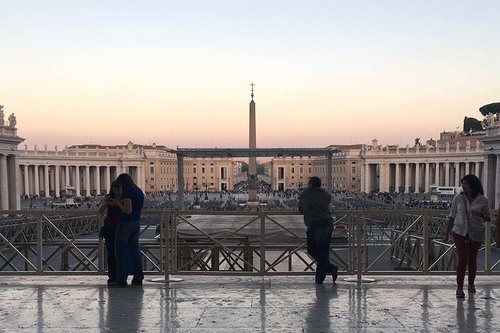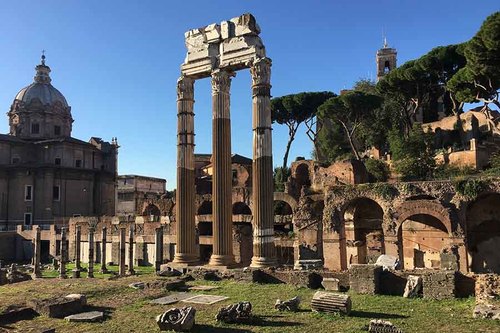
Ancient philosophers believed that the contemplative life was superior to the active life. But according to Colleen Mitchell (Ph.D. candidate, Political Science), St. Augustine presented another possible way of life for Christians: the life of charity. With the support of the Nanovic Institute, Mitchell presented her work on this idea at an academic conference at the Pontificia Università della Santa Croce in Rome, Italy.
Attending this international conference gave me the opportunity to present research that is part of my dissertation on the treatments of Rome in the works of St. Augustine and Niccolò Machiavelli. I was able to meet scholars in my field and learn more about the way that my research fits into a larger interdisciplinary discussion in Catholic Social Teaching.
Question/Motive
This project examines the classical debate about what is the best way of life for human beings. While most ancient philosophers believed that the contemplative way of life was far superior to the active way of life, Augustine challenges that view. This project seeks to explain how Augustine responds to and questions this debate as he offers up his own understanding of what the best way of life is for human beings. Moreover, this project tries to demonstrate why Augustine believes people should enter political life and labor on behalf of their neighbors, rather than seek to lead lives of pure leisure.
Some scholars, such as Hannah Arendt, claim that Augustine wants Christians to retreat from politics because there is not much that they can achieve in this imperfect world. This project questions that interpretation and wonders whether Christian charity calls upon people to do the hard work of politics on behalf of their neighbors in order to work toward greater stability and peace.

Findings
Research into Augustine’s sermons and letters, as well as into the scholarly literature on Augustine’s most famous work The City of God, supports the project’s argument that Augustine, unlike most ancient philosophers who came before him, did not believe that the contemplative life should be desired above all other ways of life. Augustine’s advice to his fellow Christians and the example of his own experiences as the Bishop of Hippo demonstrate that Christians have a duty to use their god-Given gifts to labor on behalf of their neighbors and for God. The project suggests that Augustine presents the life of charity as the best way of life for human beings; this life combines both action and contemplation and places love at the center of all human activity.
I presented this research project at a 2017 academic conference at the Pontificia Università della Santa Croce in Rome, Italy. The conference, entitled “The Heart of Work,” was dedicated to examining what role work has in the Catholic tradition. At the conference, I attended many keynote lectures and paper presentations that discussed the meaning of work and the role that it plays in human life from a Catholic perspective. I received meaningful feedback on my own research, which I plan to submit for publication.

Significance
This project aims to fit into a wider conversation about the role that work plays in the lives of Christians and the importance of charity in both labor and leisure. It offers a Christian solution to the classical belief that there are only two ways of life and that the contemplative life is superior to the active life. Furthermore, by illustrating the importance of serving one’s neighbor, this project hopes to counter the view that Augustine is an other-worldly writer who thinks that Christians should disengage from political life. It seeks to demonstrate that Augustine believes that Christians can work to improve the lives of their fellow human beings both socially and politically by using their own God-given gifts in a charitable way.
Testimonial
Attending this international conference gave me the opportunity to present research that is part of my dissertation on the treatments of Rome in the works of St. Augustine and Niccolò Machiavelli. I was able to meet scholars in my field and learn more about the way that my research fits into a larger interdisciplinary discussion in Catholic Social Teaching. I was also able to visit Rome for the first time and practice my language skills in Italian and Latin. I am most grateful to the Nanovic Institute for European Studies for its support of my research and professional development.